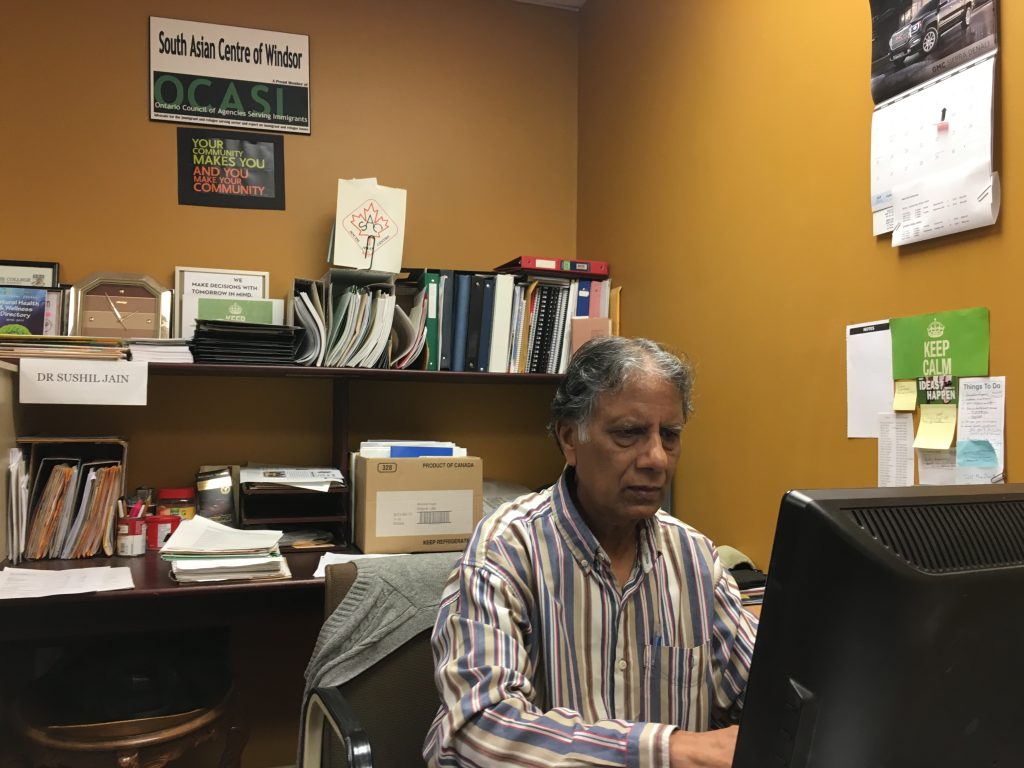Crossing the Lines: Windsor Welcomes Immigrants
25 percent of people living in Windsor-Essex County have immigrated to Canada.

Hear Windsor’s Immigrant Stories:
Olusola Taiwo
Josephina Aguilar
Sala Al-anisi
Jason Fei
Windsor Women Working with Immigrant Women is a settlement agency funded by the Canadian government that helps immigrants and refugees by providing basic English language training, employment counseling, and mental health consultation. According to Executive Director Sudip Menhas, bringing people together from all over the world is one of the strengths of the Canadian immigration system.
“Most of them are probably talking about, ‘How are your kids doing in school?’ If you have a young child, a baby, ‘How are you looking after that baby?’ The simple human things remain universal. That’s where they make the connections.”
Sudip Menhas, Executive Director of Windsor Women Working with Immigrant Women
One out of every four people in Windsor-Essex County is an immigrant, according to a 2011 survey by Statistics Canada.

“The region is appealing for many newcomers,” said Hugo Vega, the Chair of the Windsor-Essex Local Immigration Partnership. That’s a federally funded planning body that coordinates settlement services on a local level.
“Our housing prices are low. The cost of living is pretty low. Our proximity to the U.S. is a big draw because there’s a big market for jobs in the U.S.”
Hugo Vega, Chair of the Windsor-Essex Local Immigration Partnership.
“About 1,300 new immigrants have come to Windsor-Essex every year over the last decade,” said Vega. “That doesn’t include migrant workers, international students, or refugee claimants.” Though most immigrants in Canada come from China and the Philippines, Windsor is unique for its large Middle Eastern community. Sala Al-anisi was born in Windsor, but spent most of her life in Yemen with her sister Sarah. She came back to the city because she has friends and family in both Canada and the U-S.
“It’s close to Dearborn, because my aunt she lives in Dearborn. I like Windsor because it’s small, it’s safe for two girls by themselves.”
Sala Al-anisi
The Al-anisi sisters say in a few years, they hope to bring the rest of their family to Windsor. Under Canadian law, citizens can sponsor certain relatives to immigrate to the country. This can lead to a phenomenon known as “chain immigration,” where a single person may be responsible for bringing many people over. That’s what helped Dana Kanova emigrate from Eastern Europe. When her English gets better, Kanova hopes to establish her own tax service company.
“I have more than 30 years experience in Bulgaria because I had my own accounting company.”
Dana Kanova
Though many immigrants and refugees come to Windsor for a better life, it’s not always easy. Shervin Milani has an Iranian pilot’s license and engineering degrees, but said skilled labor jobs were still hard to find.
“I worked in a green house for three months, I was distributing Windsor Star newspapers at four o’clock in the morning.”
Shervin Milani
Milani now works at Windsor Women Working with Immigrant Women, but would not have left Iran if he had to do it again. “The reality is,” Milani said. “For people like us coming to Canada, we are sacrificing ourselves for our children, for the next generation.” Still, with thousands of new people coming every year and Canada’s policies promoting multiculturalism and acceptance of refugees, immigration to Windsor isn’t expected to slow down anytime soon.
